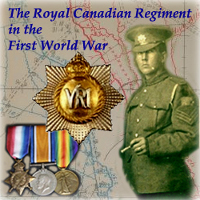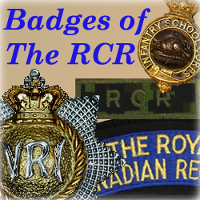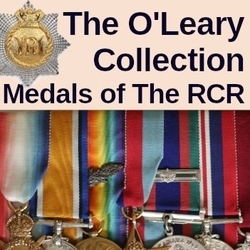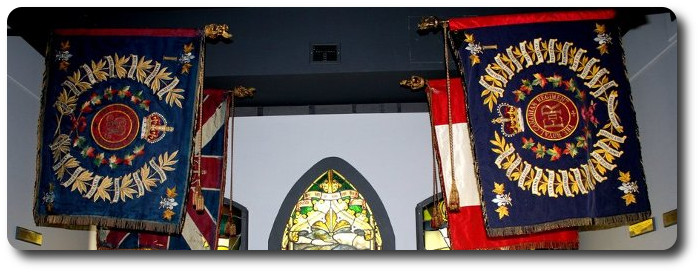
Researching The Royal Canadian Regiment
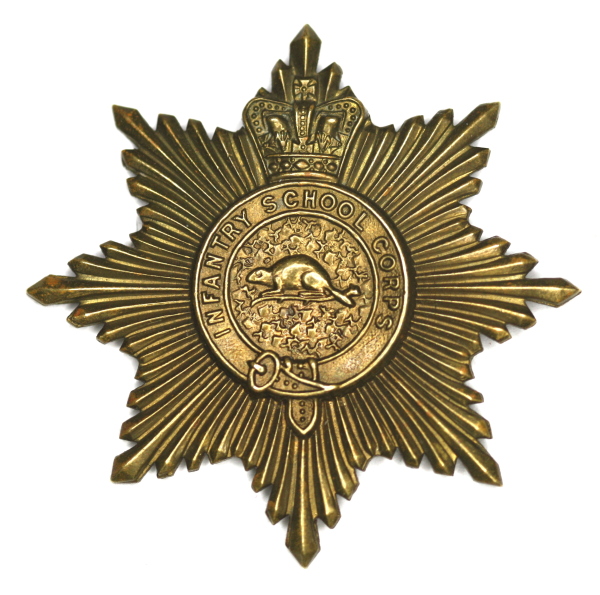
A Profile: "D" Company Infantry School Corps, 1888-90
From: Muriel Smith
Reproduced from Pro Patria (The Connecting File) Issue No. 53, Dec 1983
This year, The Royal Canadian Regiment celebrates its centenary. The past one hundred years have brought about numerous changes in The Regiment, ranging from the name it bears to its daily duties. A review of "D" Company, the Infantry School Corps, stationed at Wolseley Barracks in London, Ontario, is my birthday tribute to The Regiment.
In 1880, the question of establishing schools for the military instruction of militia men was presented to the Canadian Parliament by Major-General A.G. Luard. The motion was favourably received and by 1883, the first Canadian regular infantry force entitled the Infantry School Corps was authorized, as of 21 Dec 1883. In that same year, "A", "B" and "C" Companies were authorized in Fredericton, New Brunswick, St. Jean, Quebec, and Toronto, Ontario respectively.
The needs of the numerous Ontario militia units were too great to be properly fulfilled by the Toronto school, thus a fourth, "D" Company, was located in London (1888) with Lieutenant-Colonel Henry Smith receiving the position of Commanding Officer.
LCol Smith had been connected with the militia for thirty years prior to his appointment as Commandant. He began his military career as a Private in the Cobourg Rifle Company and later transferred to the 40th Battalion where he received officer status. When the Infantry School Corps was formed, he was posted to "C" Company in Toronto. He saw active service with the company during the North-West Rebellion, where he held the position of Assistant Adjutant General to the North-West Field Force. Major Smith was posted to London in 1887, and by virtue of his new position was promoted to Lieutenant-Colonel.
The Commanding Officer's initial duty in London was to enlist one hundred regular force soldiers. He began recruiting in January 1888 and by April of that year only forty seven men had enlisted. LCol Smith was quoted by The London Free Press. "I have been particular to receive men of only first class physique, standing at least five feet eight, and of a good chest measurement, for there are not many of us and it is well to present as credible an appearance as possible on parade."
It seems that the London public was uncertain of the differences between the militiaman and the Infantry School Corps soldier. Once again the Commandant set the record straight.
"...a misapprehension seems to have gone abroad as to the regular staff to the School, conveying the idea to the general mind that these men have simply enlisted for that term to gratify their innate desire to become soldiers. They form the nucleus of a Canadian standing army, and may be called upon to do service in any part of the Dominion... But the primary and ostensible object of this corps is to afford proper instruction to officers and men of the active militia of the country who wish to make themselves more proficient in the service."
The men enlisted for a term of three years. Upon arrival at "D" School, they were issued "kit" comprising of a cloth tunic for parade, a tweed tunic, a pair of pants, two grey flannel shirts, two heavy undershirts, a pair of top boots, a cap and helmet, a pair of mitts, a fork, knife, spoon, razor and other small personal items. This was the sole issue of kit for the three-year period of enlistment.
The life of a regular force soldier was physically demanding with many hours spent in drill, fatigue, route marches and range practice. The day began at 0530 hours in the summer and at 0630 in the winter months. The men were quartered fifteen to a room. As their sleeping quarters doubled as a dining room, it was necessary to fold up the iron cots upon rising. Each morning they tidied up their personal belongings while the orderly Man of the Day swept out the room. During breakfast, the Orderly Officer, and Orderly Sergeant visited each barrack, listening to any complaints the men may have had. If the complaints were viewed as valid, they were forwarded to the Adjutant, and then investigated by the Colonel.
The Guard Mounting and Defaulters' Parade were held at 0900 hours, and at 0915 Sick Parade was conducted.
The Orderly Room Parade, which tried those soldiers held in custody for various offences, commenced at 0930 hours. The punishments equaled the gravity of the offence with fines or confinement to barracks being the norm. The cells were reserved for severe cases. Drunkenness was punishable by a fine. For the first two offences, no punishment was awarded. If a third offence occurred within three months, the fine totaled $1.83. If it occurred between three and six months, the fine was $1.22 and if between six and nine months, the resulting fine equaled 61 cents. Finally, if an offence occurred after nine months, no punishment was awarded.
An example of a sentence was recorded in The London Free Press. On February 4, 1890, two men of "D" Company were sentenced by the Commandant to twenty-eight days confinement to barracks for being caught in a house of ill-repute. A further investigation of the military judicial system of the period is a distinct and separate topic, so let us return to the daily routine of "D" Company.
"Dress" for parade was sounded at 0940 hours. In ten minutes, the Staff Parade formed and was inspected by the Adjutant. This was immediately followed by the Battalion Parade which included regular force men, recruits and militiamen on course. The latter who were labeled "attached men", were marched to their respective instructors. The remainder of the company was either placed under command of the Quartermaster Sergeant and assigned duties or under command of the Officers for company drill.
At 1230 hours, dinner was served. From 1330 to 1530, drill for the attached officers and men was conducted. The last parade of the day at 1400 hours, saw "D" Company turn out for drill or fatigue, as detailed by the Commanding Officer. First class men could be exempted from this parade. After this, the men were allowed to go into London and those who had passes could stay out until midnight.
Retreat was sounded at sundown and the Union Jack that had been hoisted at Reveille was lowered. First Post was at 2130 hours. At this time, the canteen closed and all men not on pass were required to be in their rooms. Last Post sounded one half hour later. By 2215 hours, all lights were extinguished except those in the officers' and sergeants' quarters. Variations to the previously described routine consisted of route marches through the city, church parades and Commanding Officer's parades, the latter being held on Monday and Thursday.
There is truth in the old saying that all work and no play makes Jack a dull soldier. A quick review of the mess and canteen facilities is a prerequisite to the examination of the various clubs that were in operation at the Military School. The men's canteen was open from 0700 to 0800, 1145 to 1230 and from 1545 to 2130 hours. The reading and games room was a popular area. Here the games of checkers, dominoes and cards were enjoyed. By 1890, two hundred books had been purchased by the men through a monthly charge of five cents and was assisted by the fines imposed for drunkenness.
Athletic clubs were the order of the day. The "D" Company football team was quite successful in competition against militia and civilian teams such as the Asylum Staff. Incidentally, the Infantry School Corps won a game against the Asylum, four to one. Other popular games were cricket and baseball.
Apparently a gymnastics club was to be organized. The Government had purchased $130.00 worth of equipment which included parallel bars, vaulting bars, high bar, box horse, weights and swivel rings. Unfortunately, I have not come upon further information and therefore cannot definitely indicate if the club was formed.
Aside from athletic interests, dancing and drama were common pastimes. When the barracks first opened, civilian bands were employed by the "D" Company Dancing Club which met weekly during the winter. By 1889, the company band had been formed and within a year, with Bandmaster Fisher's aid, the band attained a degree of competency. Thus, the need to hire civilian bands ceased. Aside from its military duties, the company band furnished entertainment in Victoria Park, each Wednesday during the summers of 1890 and 1891, plus performances at various society clubs.
There was a small drama club, that was assisted by the company's minstrel group. A cup of coffee, a light snack and a few laughs were always obtainable at their weekly meetings, which were located in the west wing above the guard house.
Some of the extra curricular activities were related to the soldier's job. Telegraphic rifle contests were held between "D" Company and the other Military Schools and with the Royal Canadian Artillery. Each company team shot a specified number of rounds. The results were telegraphed to the opposing company and the winner announced.
Most military institutions had regimental mascots which ranged from goats to horses. "D" Company was no exception. It is noted that Jerry was "a regimental dog of great canine accomplishment" and was "a terror to all civilians and a thorough soldier".
The Infantry School Corps frequently interacted in a social capacity with the City of London. The London Hunt Club was entertained many times by the Officers of the Infantry School Corps and the "D" Company Band supplied the music for the first Annual Hunt Club Ball in 1890. Favourable reports regarding the celebration of St. George's Day 1890 are found in The London Free Press. "Captain Graydon also praised our militia and especially the Infantry School Corps. The "D" men showed what sort of soldiers Canada could turn out...They were the pride of everybody, especially the ladies." The very visible and well turned out appearance made by the Corps in its many route marches and church parades through London, helped to initiate the respect that The Royal Canadian Regiment receives today.
As we toast The Regiment on its 100th year, the men and events of its past shall be remembered with great veneration. As to the next century...
Muriel Smith is the wife of Lieutenant Jeffrey Smith, OC 8 Pl, "C" Company, 1 RCR. Mrs. Smith is currently [i.e., in 1983] involved in researching The RCR Band (1884-1920), toward the completion of her M.A. in Musicology at the University of Western Ontario, London, Ontario.
